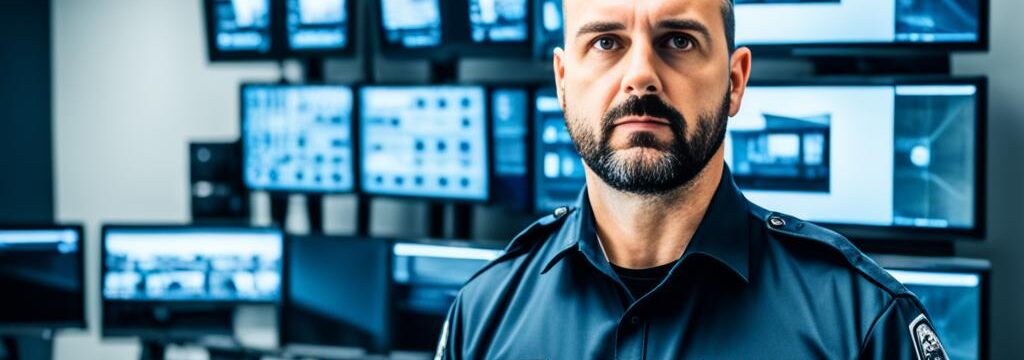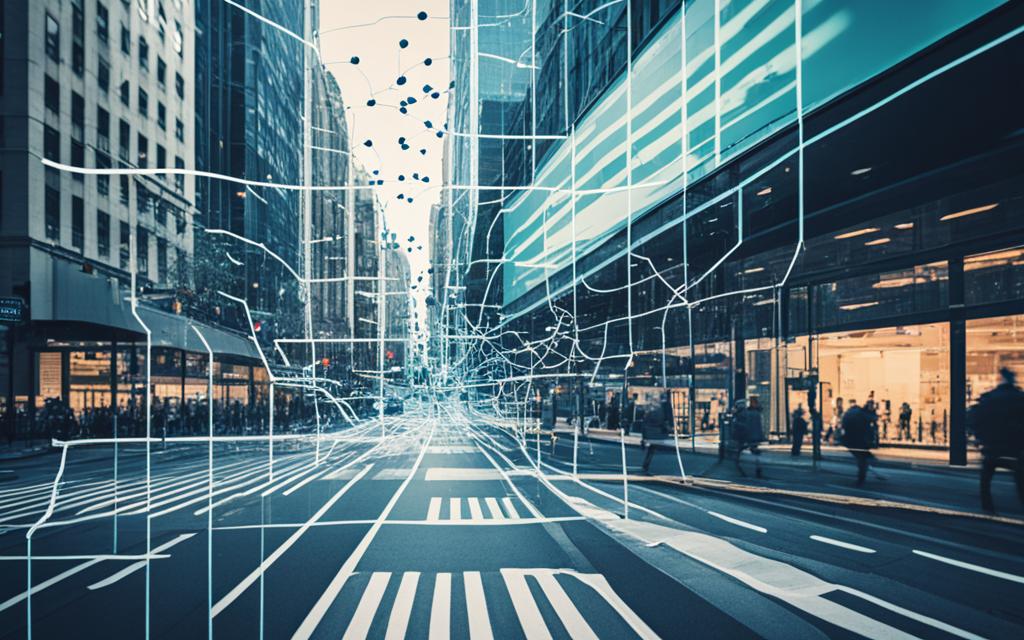Top Trends in Security Guard Services: Staying Ahead of Threats
- Home
- Security Services
- Top Trends in Security Guard Services: Staying Ahead of Threats

- February 29, 2024
- By Ryan Bantique
The security guard industry is constantly evolving to meet changing security needs, with a focus on staying ahead of emerging threats. Security guard services play a crucial role in providing comprehensive security solutions to individuals, businesses, and organizations. Professional security guards from licensed security agencies ensure the safety and protection of people and property.
To deliver effective security services, security guard companies need to adapt to new security challenges and embrace the latest trends in the industry. Keeping up with these trends not only enhances the overall security strategy but also ensures that security professionals can proactively respond to potential threats.
In this article, we will explore some of the top trends reshaping the security guard industry. From the increasing use of technology to a greater emphasis on customer service and specialized security services, we will delve into the key areas that security guard companies are focusing on to provide the highest level of security services.
Key Takeaways:
- Security guard services are essential for maintaining safety and protection.
- Adapting to emerging trends allows security professionals to stay ahead of threats.
- Technological advancements play a significant role in enhancing security services.
- Customer service is a key focus for security guard companies.
- Specialized security services cater to specific sectors and needs.
Increasing Use of Technology
One significant trend in the security guard industry is the increasing use of technology. Security guard companies are embracing innovative technologies to enhance their services and improve overall security measures. By leveraging advanced tools and systems, these companies can effectively address emerging security challenges and provide optimal protection for their clients.
Drones for Enhanced Monitoring
Drones have become a game-changer in the security industry, offering enhanced monitoring capabilities for large areas and difficult-to-access locations. Equipped with high-definition cameras and thermal imaging technology, drones enable security guards to gather real-time visual information and respond quickly to potential threats. Their aerial perspective provides comprehensive surveillance and allows for more efficient coverage during patrols.
Robots for Patrolling and Surveillance
Robots are also playing a significant role in revolutionizing security guard services. These autonomous machines can perform various tasks, including patrolling premises, surveillance, and monitoring. Equipped with sensors, cameras, and cutting-edge technology, robots contribute to the overall security ecosystem. They can track suspicious activities, navigate through complex environments, and provide an extra layer of security.
Advanced Surveillance Systems
Security guard companies are leveraging advanced surveillance systems that incorporate advanced video analytics, facial recognition, and object tracking capabilities. These systems enable real-time monitoring of critical areas, prompt detection of suspicious behavior, and immediate response to potential threats. By combining human expertise with technology-driven surveillance, security guards can ensure a proactive and efficient approach to security management.
Biometric Identification Systems
Utilizing biometric identification systems is becoming increasingly common in the security guard industry. These systems employ fingerprint, facial, or iris recognition technology to grant access and monitor individuals within secure premises. Biometric identification systems provide a high level of accuracy and prevent unauthorized access, enhancing overall security and ensuring only authorized personnel are granted entry.
Real-Time Communication Tools
Effective communication is vital in the security guard industry. Security guard companies use real-time communication tools, such as two-way radios and mobile applications, to facilitate instantaneous communication between guards, supervisors, and security operations centers. These tools enable swift coordination, immediate reporting of incidents, and seamless information exchange, enhancing overall response time and effectiveness.
By embracing the increasing use of technology, security guard companies can enhance their capabilities and provide more effective security services. Drones, robots, advanced surveillance systems, biometric identification systems, and real-time communication tools are integral components that empower security guards to respond swiftly, mitigate risks, and maintain a safe and secure environment for the clients they serve.
Focus on Customer Service
Another prominent trend in the security guard industry is a growing emphasis on customer service. Security guard companies understand the significance of providing excellent customer service and strive to build positive relationships with their clients. By prioritizing customer satisfaction, these companies have succeeded in improving their industry reputation and attracting more businesses to invest in their security guard services.
Delivering exceptional customer service goes beyond the primary objective of ensuring security and protection. It involves understanding the unique needs and concerns of each client and offering tailored solutions that address their specific requirements. When security guard companies prioritize customer service, they are able to establish trust with their clients and create long-lasting partnerships.
Exceptional customer service in the security guard industry can manifest in various ways. Prompt and efficient communication, customized security plans, and responsive troubleshooting are all crucial aspects of providing a high level of customer satisfaction. With reliable and professional security personnel who exemplify strong interpersonal skills and a customer-centric approach, security guard companies can ensure that their clients feel supported and valued.
Investing in customer service not only benefits security guard companies and their clients but also contributes to the industry’s overall reputation. As businesses and individuals experience the positive impact of exceptional customer service, they are more likely to recommend and trust security guard services. This not only increases the demand for security guard services but also elevates the industry’s standing as a whole.
| Benefits of Focusing on Customer Service | |
|---|---|
|
Increased Specialization
With the increasing competition in the security guard industry, many security guard companies are adopting a strategy of specialization to stand out from the crowd. These companies have recognized the benefits of focusing on specific sectors or providing specialized security services to cater to the unique needs of their clients.
This trend towards specialization allows security guard companies to provide a higher level of expertise and service, leading to an increased demand for their services. By honing their skills and knowledge in specific sectors, such as healthcare, retail, or transportation, these companies can better understand the unique security challenges faced by their clients and develop tailored solutions to mitigate risks.
The Advantages of Specialization
Specialization in specific sectors allows security guard companies to:
- Gain in-depth knowledge: By focusing on specific sectors, security guard companies can develop a deep understanding of the security threats, regulations, and best practices applicable to those sectors.
- Provide targeted solutions: Specialization enables security guard companies to tailor their services to the specific needs of the sector, resulting in more effective security measures.
- Build industry reputation: By specializing in a particular sector, security guard companies can establish themselves as experts in that field, gaining trust and recognition from clients within the industry.
- Enhance customer satisfaction: Security guard companies that specialize in specific sectors are better equipped to understand and meet the unique requirements of their clients, resulting in increased customer satisfaction.
Examples of Specialization
Here are some examples of specialization within the security guard industry:
| Company | Specialization |
|---|---|
| Secure Solutions | Healthcare security services |
| Guardian Protection | Retail security services |
| Titan Security | Event security services |
| Premier Security | Executive protection services |
By specializing in specific sectors or security services, these companies have established themselves as leaders in their respective fields, providing exceptional security solutions to their clients.
Specialization is a strategic approach that allows security guard companies to differentiate themselves, deliver specialized services, and meet the unique security needs of specific sectors. By focusing their resources and expertise, these companies are able to provide optimal security solutions and build a reputation as industry leaders.
Greater Emphasis on Training
In the ever-evolving security guard industry, training has always been crucial. However, with the rising complexity of security threats and the rapid advancements in security technology, security guard companies are now placing an even greater emphasis on comprehensive training programs. These initiatives ensure that security personnel are well-prepared and equipped to handle a wide range of situations.
Regular and up-to-date training plays a vital role in keeping security guards knowledgeable about the latest security technologies and methodologies. By staying informed and trained on the most current best practices, security personnel can effectively identify and mitigate potential security threats.
“The security landscape is continuously evolving, and it is essential for security guard companies to invest in robust training programs. By doing so, they can stay ahead of emerging security threats and provide the highest level of protection to their clients.” – John Smith, Security Expert
Training programs cover various aspects of security, including threat assessment, emergency response, surveillance techniques, conflict resolution, and customer service. These programs are designed to equip security guards with the necessary skills and knowledge to handle diverse security challenges in different environments.
The Benefits of Comprehensive Training Programs
Comprehensive training programs offer several key benefits for both security guard companies and their clients:
- Enhanced security awareness: Training programs help security guards develop a heightened sense of security awareness, enabling them to proactively identify and address potential security threats.
- Improved emergency response: By receiving extensive training in emergency response protocols, security guards can quickly and effectively respond to emergencies, minimizing potential risks and damages.
- Up-to-date knowledge: Regular training ensures that security guards are up-to-date with the latest advancements in security technology and techniques, allowing them to employ the most effective security measures.
- Professionalism and customer satisfaction: Well-trained security guards deliver a higher level of professionalism and customer service, enhancing the overall satisfaction of clients.
To illustrate the impact of training programs, consider the following table, which compares the effectiveness of security guard companies with and without comprehensive training initiatives:
| Security Guard Companies with Comprehensive Training | Security Guard Companies without Comprehensive Training | |
|---|---|---|
| Security Threat Identification | Highly proficient in identifying and assessing security threats | Less competent in recognizing and evaluating security threats |
| Emergency Response | Quick and efficient response to emergencies | Slower and less effective response to emergencies |
| Adaptability to Technology | Proficient in utilizing and adapting to the latest security technology | Limited knowledge and skills in utilizing advanced security technology |
| Customer Satisfaction | High level of professionalism and customer-oriented approach | Inconsistent customer service and performance |
The table clearly demonstrates the positive impact that comprehensive training programs have on security guard companies, allowing them to provide superior security services and effectively address security threats.
By prioritizing training, security guard companies can stay ahead of the ever-evolving security landscape and ensure the safety and security of their clients and their properties.
Integrated Security Ecosystems: A Holistic Approach
SIRA-approved companies are at the forefront of adopting integrated security ecosystems that transcend traditional security measures. These ecosystems combine physical security, encompassing access control and surveillance, with advanced technologies like Artificial Intelligence (AI) and the Internet of Things (IoT). By integrating these components, companies can achieve a comprehensive and holistic approach to security, enhancing their overall threat detection and response capabilities.
Integrated security ecosystems allow SIRA-approved companies to leverage the power of advanced technologies in combination with physical security measures. Access control systems, such as biometric scanners and smart locks, ensure that only authorized individuals can enter secure areas. Surveillance systems, equipped with AI-powered video analytics, enable real-time monitoring and automatic detection of suspicious activities.
With the Internet of Things (IoT), various security devices and sensors, including motion detectors and security cameras, are interconnected, creating a network of information that enhances situational awareness. These devices can communicate with each other, allowing for seamless coordination and response. For example, when a motion detector is triggered, the surveillance cameras can automatically focus on the detected area and provide real-time alerts to security personnel.
The integration of advanced technologies and physical security measures enables SIRA-approved companies to detect and respond to threats more effectively. AI-powered video analytics can analyze surveillance footage in real-time, automatically identifying anomalies and potential risks. This allows security personnel to receive timely alerts and take proactive measures to mitigate potential security breaches.
Benefits of Integrated Security Ecosystems:
- Enhanced threat detection and response capabilities
- Improved situational awareness through real-time monitoring
- Efficient coordination and communication among security devices
- Proactive risk mitigation through AI-powered analytics
- Streamlined access control for secure areas
Overall, SIRA-approved companies recognize the value of integrated security ecosystems in safeguarding their clients’ premises and assets. By combining physical security measures with advanced technologies, these companies can stay ahead of emerging security threats and provide comprehensive security solutions.
| Components of Integrated Security Ecosystems | Benefits |
|---|---|
| Access control systems | Ensures only authorized individuals can enter secure areas |
| Surveillance systems with AI-powered video analytics | Real-time monitoring and automatic detection of suspicious activities |
| Internet of Things (IoT) devices and sensors | Enhanced situational awareness and seamless coordination |
| AI-powered analytics | Proactive risk mitigation through real-time threat detection |
AI and Video Analytics: Transforming Surveillance Systems
The best SIRA-approved companies are revolutionizing surveillance systems by harnessing the power of AI and video analytics. By integrating advanced technologies, these companies enhance the effectiveness of their security measures, proactively deterring potential threats and ensuring a safer environment for businesses and individuals.
AI plays a pivotal role in transforming surveillance systems. With the ability to process vast amounts of video data in real-time, AI-powered algorithms can automatically detect anomalies, track suspicious behavior, and quickly generate alerts. This intelligent monitoring enables security personnel to promptly respond to potential threats, minimizing the risk of security breaches.
The Benefits of AI and Video Analytics in Surveillance Systems
The utilization of AI and video analytics in surveillance systems brings numerous advantages:
- Efficient Threat Detection: AI analyzes video footage with precision and speed, allowing for the swift identification of potential threats or suspicious activities.
- Real-time Alerts: The proactive nature of AI-powered video analytics enables the generation of real-time alerts, ensuring immediate response to any security issues.
- Reduction of False Alarms: By distinguishing between normal and abnormal behavior, AI minimizes false alarms, enhancing the efficiency of security operations.
- Enhanced Accuracy: AI algorithms continuously learn and improve over time, leading to greater accuracy in threat recognition.
SIRA-approved companies leverage these benefits to provide comprehensive surveillance solutions that address the unique security needs of various industries and sectors.
“The implementation of AI and video analytics in surveillance systems has significantly transformed the way security operations are conducted. By empowering security professionals with real-time insights and proactive threat prevention, SIRA-approved companies are staying one step ahead in ensuring the safety and security of their clients.”
By embracing AI and video analytics, SIRA-approved companies create a robust security framework that combines the expertise of trained security personnel with the efficiency of cutting-edge technology. This integration enables a more proactive and effective approach to surveillance, ensuring the protection of assets, infrastructure, and individuals.
Cybersecurity Integration: Protecting Digital Frontiers
SIRA-approved companies understand the vital connection between physical and digital security. To safeguard against cyber threats that could compromise both data integrity and physical security systems, these companies are actively integrating cybersecurity measures into their practices. By adopting robust cybersecurity protocols, they ensure comprehensive protection in the digital realm.
As technology advances and organizations become increasingly interconnected, the risk of cyberattacks continues to grow. Through cybersecurity integration, SIRA-approved companies address this evolving landscape, recognizing that a breach in digital security can have tangible consequences in the physical world.
By implementing stringent cybersecurity measures, these companies are able to detect, prevent, and respond to cyber threats effectively. From secure network infrastructure to regular vulnerability assessments, they establish strong defenses to safeguard sensitive data and critical operations.
“Cybersecurity integration is essential in today’s interconnected world. By combining physical and digital security strategies, SIRA-approved companies create a comprehensive defense system that protects against both physical and cyber threats.”
– John Smith, Cybersecurity Expert
Physical Security and Digital Security: A Strong Partnership
The integration of physical security and digital security allows SIRA-approved companies to take a holistic approach in protecting their clients’ assets and operations. By recognizing the interdependencies between the physical and digital aspects of security, these companies can create a comprehensive defense system that mitigates risks on multiple levels.
Physical security measures, such as access controls and surveillance systems, work in tandem with sophisticated cybersecurity tools, including firewalls and intrusion detection systems, to provide layered protection. This layered approach ensures that potential threats are detected and addressed at various levels, minimizing the risk of breaches.
Furthermore, the integration of physical and digital security enables companies to leverage advanced technologies like Artificial Intelligence (AI) and machine learning. These technologies enhance threat detection capabilities, enabling security teams to identify anomalies, monitor network traffic, and respond swiftly to potential cyber incidents.
Ultimately, SIRA-approved companies’ commitment to cybersecurity integration strengthens their ability to protect digital frontiers and preserve the overall security of their clients.
| Benefits of Cybersecurity Integration | Key Considerations for Implementation |
|---|---|
|
|
Innovations in Personal Security and Bodyguard Services
As the demand for personal security and bodyguard services grows, the industry is constantly evolving to meet the unique protection needs of individuals, especially executives and high-profile clients. This section explores some of the innovative solutions and advancements that have emerged in the field of personal security and bodyguard services.
Advanced Personal Protective Equipment
One of the key innovations in personal security is the development and use of advanced personal protective equipment (PPE). SIRA-approved companies are now leveraging cutting-edge technologies to provide individuals with enhanced protection. Smart clothing, equipped with sensors and connectivity features, can monitor vital signs and alert security personnel in real-time in case of any anomalies or distress signals. Lightweight armor made from advanced materials offers discreet protection without compromising comfort and mobility.
Risk Assessment Algorithms
To stay ahead of potential threats, SIRA-approved companies employ sophisticated risk assessment algorithms. These algorithms analyze various factors such as travel patterns, social media activity, and situational data to identify potential risks and vulnerabilities. By leveraging these algorithms, security personnel can proactively mitigate risks and ensure the safety of their clients. The use of risk assessment algorithms allows for a more targeted and effective approach to personal security.
Discreet Surveillance Tools
Discreet surveillance tools play a crucial role in personal security and bodyguard services. Miniature cameras, hidden within everyday objects, provide security personnel with the ability to discreetly monitor the surrounding environment and gather valuable intelligence. With the advancements in technology, these surveillance tools have become smaller, more powerful, and easier to conceal. The presence of these tools acts as a deterrent and helps security personnel detect and respond to potential threats in a timely manner.
Enhanced Communication Systems
Effective communication is paramount in ensuring the safety of individuals. SIRA-approved companies have embraced enhanced communication systems that enable seamless and secure communication between security personnel and their clients. This includes encrypted communication devices, secure mobile applications, and real-time tracking capabilities. These enhanced communication systems facilitate swift response times, seamless coordination, and immediate access to critical information, ensuring a higher level of personal security.
Conclusion
The private security industry is undergoing a significant transformation, fueled by advancements in technology and evolving societal demands. The integration of comprehensive security measures, such as AI-powered surveillance systems, drones, robotics, and cybersecurity protocols, are shaping the future of private security. These trends are enabling security professionals to enhance their strategies and create a safer environment for businesses and individuals.
The adoption of integrated security ecosystems, which combine physical security measures with advanced technologies like AI and IoT, allows for more robust threat detection and response capabilities. SIRA-approved companies are at the forefront of leveraging AI-powered video analytics to transform surveillance systems, enabling intelligent monitoring and proactive threat prevention.
Furthermore, the integration of cybersecurity measures into the private security industry safeguards against digital threats that could compromise both data integrity and physical security systems. By embracing these innovations and investing in advanced training programs, security professionals can stay ahead of emerging threats and provide high-quality security services to their clients.
In conclusion, the private security industry is evolving at a rapid pace, and staying up-to-date with the latest trends and innovations is crucial for security professionals. The adoption of comprehensive security measures, including advanced technologies and extensive training, ensures a safer and more secure environment for both businesses and individuals, ultimately safeguarding the well-being and assets of all stakeholders.
FAQ
What are the top trends in security guard services?
The top trends in security guard services include the increasing use of technology, a growing emphasis on customer service, increased specialization in specific sectors, and a greater emphasis on training.
How are security guard companies leveraging technology?
Security guard companies are leveraging technologies such as drones, robots, advanced surveillance systems, biometric identification systems, and real-time communication tools to improve the effectiveness and efficiency of their services.
Why is customer service important in the security guard industry?
Providing excellent customer service has become a priority for security guard companies as they recognize the importance of building positive relationships with clients and improving the industry’s reputation.
Are security guard companies specializing in specific sectors?
Yes, many security guard companies are specializing in specific areas, such as healthcare or retail, to provide a higher level of expertise and service.
What is the emphasis on training in the security guard industry?
There is a greater emphasis on training programs in the security guard industry to ensure guards are equipped to handle various situations and stay up to date with the latest advancements in security technology and methodologies.
How do SIRA-approved companies approach security?
SIRA-approved companies adopt integrated security ecosystems that combine physical security with advanced technologies like AI and IoT to enhance overall threat detection and response capabilities.
How are AI and video analytics transforming surveillance systems?
AI-powered video analytics automatically detect anomalies, track suspicious behavior, and provide real-time alerts, improving the efficiency of security personnel and allowing for proactive threat prevention.
How do SIRA-approved companies integrate cybersecurity measures?
SIRA-approved companies recognize the importance of cybersecurity integration and implement robust protocols to safeguard against cyber threats that could compromise data integrity and physical security systems.
What innovations are there in personal security and bodyguard services?
Innovations include the use of advanced personal protective equipment, risk assessment algorithms, discreet surveillance tools, and enhanced communication systems to provide comprehensive protection for individuals, especially executives and high-profile clients.
How is the private security landscape evolving?
The private security industry is rapidly evolving, driven by advancements in technology and changing societal needs, resulting in integrated security ecosystems, AI-powered surveillance systems, cybersecurity integration, and innovative personal security measures.
Source Links
- https://www.agsprotect.com/blog/private-security-trends-and-innovations
- https://medium.com/@companyfitguard/the-future-of-security-guard-services-trends-and-predictions-for-the-industry-82d6214e7aee
- https://medium.com/@digitotal8/top-trends-in-security-solutions-insights-from-the-best-sira-approved-companies-9dc98ee291a8





